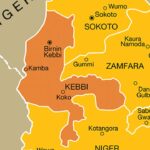Despite the implementation of the Subscriber Identity Module (SIM) linkage to National Identification Number (NIN) policy, kidnappers and bandits operating mostly in the North West of the country still use mobile phones with SIM cards to demand huge ransom from their victims’ families, Daily Trust can report.
This is contrary to the federal government’s claim that the implementation of the SIM linkage to NIN policy will help stop ransom demand and reduce insecurity in the country.
- 33 states may not pay salaries as N172bn deduction grounds revenue disbursement
- Jamoh takes Nigeria’s campaign for IMO seat to London
President Muhammadu Buhari had said while launching the National Policy for the Promotion of Indigenous Content in Nigerian Telecoms Sector and Revised National Identity Policy for SIM Cards registration in May this year that proper identification of all Nigerians and legal residents in the country and ability to conveniently access a database will enhance effective planning and security oversight.
“The NIN will cover one of the weaknesses in our security structure. We will be able to easily identify and know the personality of Nigerians. We will identify people easily, including the crooks,’’ he had said.
The federal government in December 2020 issued a strong directive to NIMC, NCC and telecom companies to get all active SIM cards linked to NIN to among others curb insecurity which has put the country on edge in the last one year.
The Minister of Communications and Digital Economy, Dr Isa Pantami said any SIM card without the owner’s NIN linked to it will be barred from the telecom network.
It has been extended about six times, but the government had now put October 31 as the new deadline.
Currently, 245 million numbers have been linked to 54 million NINs, according to records from the Nigerian Communications Commission (NCC) and The National Identity Management Commission (NIMC).
NIN’s roles in Nigeria’s planning, security situation
The Director General of NIMC, Engr Aliyu Aziz said with NIN, all citizens enjoy a “one-person-one-identity”, which allows the government to search for an individual and all of his/her details either for planning and or for security purposes.
“Government can query the database to ascertain how many unemployed individuals are in the system at federal and state levels, the genders of those individuals, their occupation, skillset, age bracket, location,’’ the NIMC DG said.
On security, Aziz said, the relevant government security agencies were part of the National Identity Management System (NIMS) project from inception and have access to query the system using biometrics, etc to confirm an individual’s identity.
However, despite this claim, insecurity has failed to abate in the country with scores of people being abducted even as demands for ransom are still being made via phone calls by bandits and kidnappers.
Telecommunication networks had to shut down in Zamfara and parts of Katsina, Sokoto and Kaduna State for what state governments said was a measure to stop communication between kidnappers and families of victims.
However, only a few days ago, bandits in Zamfara State reached out to families of two graduates abducted en route to the National Youth Service orientation camp in Kebbi State.
The kidnappers reportedly demanded N2m ransom for each of the victims, Jennifer Iorliam and Joseph Aondona and two other commuters kidnapped along with them via phone calls to their families.
The victims were said to have boarded a bus from Benue State to Sokoto State before they were intercepted around Tsafe Local Government Area of Zamfara State.
Judith Benson, the elder sister of 29-year-old Iorliam, told a journalist on the phone that the kidnappers had reached out to the family and demanded N2m ransom.
She said the kidnappers revealed that they moved to Gusau where the mobile network ban had been lifted to make calls and vowed to return the victims to the forest if the ransom was not paid on time.
Also last week, armed bandits released the Emir of Bungudu in Zamfara State, Hassan Attahiru, after negotiating and collecting N20m ransom with emirate officials on phone.
In August, bandits who kidnapped the students and staff of the College of Agriculture and Animal Science, Bakura in Zamfara also demanded N350 million ransom via mobile phone.
The Provost of the College, Alhaji Habibu Mainasara had said the bandits called him and told him that they “Needed N350 million for the 20 people currently in their captivity.
“They said that the money must be paid before they could release the staff and the students they kidnapped in my school,” he added.
Similarly, a report released by the West Africa Network for Peace Building (WANEP) at the weekend showed that 496 civilians and 87 security personnel were killed as a result of various attacks by armed groups across the country in the month of September. Such attacks are usually planned through communication among bandits’ groups.
SIM-NIN policy is effective – FG
But Pantami said the SIM-NIN policy is effective as a lot of successes have been recorded by the security operatives.
Pantami who spoke to Daily Trust through his media aide Uwa Suleiman last night said criminals no longer use their own mobile lines to contact their victims’ families to demand for ransom but use the seized mobile lines of their victims to do so.
“The bandits and kidnappers also waylay travellers on the road and forcefully collect their phones to quickly call victims’ friends and relatives of kidnap victims to make demands. This happens now, but I can’t divulge more details as they border on security. You may wish to contact the security operatives to get details’’, Mrs Suleiman said.
She said nobody should doubt the effectiveness of SIM-NIN policy as some African countries like Tanzania and others are now copying it.
She said: “Nothing wrong with the policy, it is robust. Though it is still ongoing, its full implementation, after its completion, will drastically bring down the rising insecurity in the country.
The Executive Vice Chairman of the NCC, Prof. Umar Garba Danbatta had earlier said that kidnappers and armed bandits now use telephones of their victims to evade being tracked.
Danbatta disclosed this in June at the National Secretariat of the All Progressives Congress (APC) during the mid-term scorecard presentation of activities of the Ministry of Communication and Digital Economy, organised by the APC Professionals Forum.
Responding to why the security agencies cannot track down kidnappers and bandits after the nationwide SIM registration exercise, the NCC boss said that the commission had been up to its game, by providing the much-needed technical backup to the security agencies.
“The kidnappers when they kidnap their victims, they change tactics. Before now, they were making calls with their own handsets, now they are using the handsets of their own victims. So when you visit the database you can’t come up with the information of the victim and not the person who kidnapped him or her.
“But still once a call is made, we can establish where that call is coming from. It can be tracked with precision to where it is coming from. So we still provide this information to security agencies in order to reduce instances of kidnappings even though it is the picture of the victims that come up instead of the person committing the crime.
“And again the security agencies have been using their devices to intercept any information to tackle the menace. It may take time to get to the victims and lead to where the kidnappers are. Yes, they keep changing tactics and I believe the security agencies too are changing their tactics.”
Why it isn’t working – Expert
But an IT security expert, Tokunboh Smith said NIN-SIM linkage failed to curb insecurity because it had been politicized.
“This is a political issue. There is no sincerity in the system, if those involved are doing the right thing and ready to curb insecurity arising from SIMs and mobile usage, they know what to do. NCC has the resources, police and other security agents are up to the task but they have not been given the independence to do their work. They are remotely being controlled’’, Smith said.
He advised that other ICT tools like CCTV technology, tracking technology, social media and mobile phone should be used to tackle crimes in the country.
He said: “My advice to the government on insecurity is to allow all those responsible for curbing crimes to perform their duties. They should also protect informants and whistle-blowers. As regards NIN-SIM linkage, there should be transparency. The government should collaborate with the service providers for better solutions. The government should be ready to take and use the advice from service providers to accomplish their objectives.”
Also, a lead consulting strategist at DigitalSENSE Africa, Remmy Nweke, said the government is not sincere enough in using the SIM-NIN linkage to fight insecurity.
“It goes to show how committed the government of the day and precisely the sincerity of security operatives. It also behoves on political willingness to arrest the situation’’, Nweke said.
On whether the kidnappers and other criminals are using advanced technology know-how to bypass the SIM-NIN linkage, Remmy said “No, the government is not technology handicapped. I believe the criminals don’t have as much expertise as the government does.
“But it is just the case of the unwillingness of the security operatives and leadership issue’’, he added.
However, on his part, another IT expert and journalist, Chukwuemeka Fred Agbata (CFA) said technology is hardly foolproof and could be bypassed.
CFA said there could other important aspects that would be necessary for any solutions developed to work.
“It is unwise for anyone to assume that NIN would solve the issues of banditry in the midst of poverty, hunger, joblessness etc. Nigerian leaders must work hard to reduce poverty, improve education and invest heavily in security and stop assuming that technology can solve those fundamental societal problems’’, he said.
“It is good that government now has the NIN of Nigerians in a database. However, what needs to be done particularly in the most disadvantaged places is to create more opportunities so that young people in those localities can aspire.’’

 Join Daily Trust WhatsApp Community For Quick Access To News and Happenings Around You.
Join Daily Trust WhatsApp Community For Quick Access To News and Happenings Around You.

